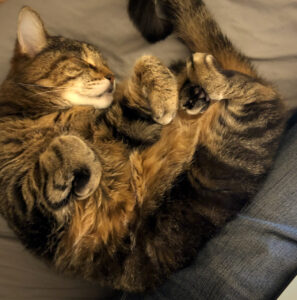
Photo by John Griswold
Maybe you have had a cat like our Abbey—everything on her terms, selective in her affections, so distant she seemed half-wild, but firmly part of the family. We adopted her and her “brother” at the same time, when our sons were little. We found her in the PetSmart room devoted to shelter cats, where the workers let her roam free as other cats looked out from cages. They thought it was funny to grab her up as she raced past, put her on her back in the crook of an arm, like a baby, and pretend-claw her stomach until she bit their arms and did the disembowelment kick with her hind legs. It was no game to her.
Years later she still held herself tense when picked up, and she never sat a lap willingly. She often disappeared to remote aeries she made on a collapsing box or pile of hair-covered clothes waiting for donation. We often searched for her, worried she had gotten out, but found her basking in the sun, her golden-green eyes slits.
I was impatient with her plotting for years to run out the door, lying in wait behind furniture to make a lunge for it. She had several successful escapes, in gator country, and there was that incident when I had to climb up and stand on a brick wall to coax her from the roof.
Her play, for years, was always too wild, desperate almost, half-mad. She killed lizards that got in the house and left them bloody on the floor, or sat watching their detached tails squirm like worms. She climbed the Xmas tree and brought it down a couple of times, destroying beloved glass ornaments, once nearly on my head.
For years she pooped behind the washer instead of in one of the litter boxes, and she never met a damp bath mat she did not pee on. She chewed everything, including expensive digital device cords, and her teeth occasionally just fell out on the counter. She licked things compulsively—it hurt the flesh of your arm—and pretended to clean her brother’s head in order to create a vaudeville of ensuing violence.
But she loved pets and scritches, and talked and talked to remind us about them, when she was ready, or about food, or to ask what you were doing standing there like that on a Thursday night. She sometimes screamed like a panther in the dark wee hours, waking the whole house, when she saw a strange cat or a possum out the window.
She is maybe 14, 15 years old now. At the start of December her back half suddenly had no balance and fell over when she walked. The vet did a low-stress neurological exam and said it was likely brain cancer. She said Abbey did not seem to be processing vision from one eye. She said she was not in pain but gave her a month. There was some chance it was a stroke, the vet said; if so, the future was more uncertain. Our elder son wanted to be sure she did not suffer and said, “Don’t wait for me to get home from school.” I made her a perfect nest out of my sleeping bag at the foot of the bed and gave her her own food and water bowls and litter box, so she did not have to go downstairs. She became a perfect roommate, well-behaved and calm.
It has been four months, and she has not worsened. In fact, I did a sort of kitty rehab by petting her and letting my hand rest lightly against her tail after each stroke. She still seems connected to her tail, so she felt my hand with her tail and never fell as I did that. After a while the staggering eased a bit. She wants constant pets, so she has had all the pets in the world, and she wants peace and has gotten it. I work, and she naps. When my sleeping bag got so hairy she did not like it, I made a better nest of pillows, towels, and one of my pullovers.
Now she even lies next to me, stretches luxuriously upside-down, kneads the air with her paws, snuggles her tail or rear paws against me for warmth. She is sleek, fat, thickly furred. She purrs at the edge of my hearing and smiles. She no longer runs if I sneeze or get up. The heating vent in the floor is her sport and luxury, and she often visits downstairs or is visited by others. Sometimes she likes to stare at the wall, interested, ears alert, alone in her catness and private plans.
